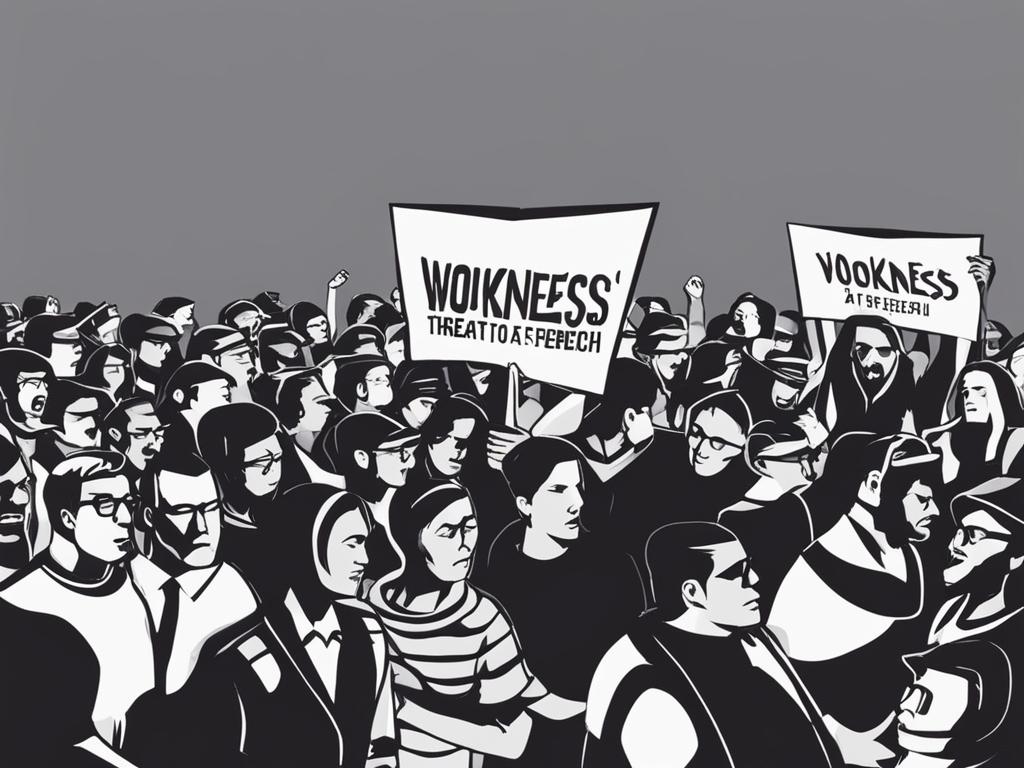Wokeness has become a significant concept in the realm of politics, encompassing an awareness of systemic issues related to race, gender, and sexuality. This term, which refers to being socially and politically awakened, has gained traction in recent years, particularly within the realms of social justice and progressive ideology.
The rise of wokeness can be attributed to various factors, including the increasing incidents of racial injustice, the erosion of LGBTQ+ rights, and the shifting political landscape. It has prompted individuals, organizations, and policymakers to address these pressing issues and advocate for change.
Woke culture and its associated values have had a profound impact on leftist politics, paving the way for conversations about social justice and the need for equity. However, it has also faced its fair share of criticism, with opponents citing concerns about political correctness and cancel culture.
Key Takeaways:
- Wokeness is a term that denotes an awareness of systemic issues related to race, gender, and sexuality in the political sphere.
- It has gained prominence due to events like racial injustice and erosion of LGBTQ+ rights.
- Wokeness has contributed to progressive ideologies and leftist politics.
- However, it has also faced criticism, with concerns raised about political correctness and cancel culture.
- Understanding wokeness is essential for comprehending discussions surrounding social justice and equity.
The Evolution of Wokeness and Its Impact on Society
The viral footage of George Floyd’s death brought issues of systemic oppression and discrimination to the forefront of public consciousness. This event sparked conversations and debates surrounding diversity, equity, and inclusion (DE&I) in society and the workplace.
Wokeness has evolved from a term associated with racism awareness to encompass awareness of various aspects of DE&I, including systemic issues related to race, gender, and sexuality. This evolution has led to the rise of social movements like Black Lives Matter and #MeToo, highlighting the need for change in various areas of society.
These social movements have mobilized millions of people worldwide, demanding justice, equality, and an end to systemic discrimination. By amplifying marginalized voices and shedding light on the lived experiences of oppressed communities, they have brought attention to the urgent need for societal transformation.
The Black Lives Matter movement, in particular, seeks to address systemic racism and police brutality, advocating for widespread reforms and the recognition of Black humanity. The #MeToo movement focuses on raising awareness about sexual assault and harassment, aiming to challenge patriarchal systems and empower survivors.
Through protests, advocacy, and online campaigns, these movements have not only brought attention to longstanding issues but have also catalyzed concrete changes. They have spurred companies to reevaluate their practices, governments to implement policy reforms, and individuals to examine their own biases and privileges.
However, the impact of these movements goes beyond immediate changes. They have ignited crucial conversations about systemic oppression, discrimination, and the need for diversity, equity, and inclusion in every aspect of society. Organizations across various industries have been forced to confront their own biases and work towards creating more inclusive environments.
Quotes about the impact of social movements:
“Social movements have the power to shape and challenge societal norms, influencing policy and ushering in real change.” – Jane Ramirez, Activist
“Wokeness isn’t just a buzzword; it signifies a cultural awakening, an understanding that systemic discrimination must be dismantled for a fair and equitable society.” – Rashid Johnson, Scholar
The Impact of Social Movements and DE&I Efforts:
| Social Movement | Impact |
|---|---|
| Black Lives Matter |
|
| #MeToo |
|
The impact of these social movements and the growing emphasis on DE&I cannot be overstated. They have fundamentally altered the discourse around systemic oppression and discrimination, pushing for greater accountability and change on personal, societal, and institutional levels.
As society continues to evolve, it is crucial to recognize that progress towards equality and inclusion requires ongoing commitment and action. The transformative power of these movements lies in their ability to inspire collective action and challenge existing power structures.
Criticisms of Wokeness and the Backlash Against It
Despite its intentions, wokeness has not been immune to criticism and backlash. Opponents often use the term mockingly and view it as a form of insincere activism. Detractors equate wokeness with political correctness, cancel culture, and left-leaning bias, dismissing it as a trend lacking substance. They argue that the concept has been co-opted by mainstream culture, diluting its original meaning and power.
One of the main criticisms leveled against wokeness is its association with performative activism. Critics argue that many individuals and organizations engage in surface-level gestures and symbolic actions without effecting real change. This leads to the perception that wokeness is more about virtue signaling and social validation than genuine efforts to address societal issues.
Additionally, some companies have faced backlash for their support of diversity, equity, and inclusion (DE&I) initiatives. This backlash has manifested in consumer boycotts and negative impacts on sales and stock shares. Critics claim that these companies are prioritizing a perceived left-leaning bias over their core business objectives, leading to a divide among consumers and shareholders.
“Wokeness has become synonymous with political correctness, cancel culture, and a left-leaning bias. It has lost its original meaning and purpose, and has now become a pejorative term used to dismiss genuine social justice efforts.” – Mark Thompson, Political Analyst
The resistance against wokeness is fueled by a growing belief that it enforces conformity of thought, stifles free speech, and fosters a culture of hypersensitivity. Critics argue that any dissent or disagreement is met with accusations of intolerance or bigotry, inhibiting open and honest dialogue.
In response to these criticisms, there is a call for more meaningful action and genuine allyship. Activists and advocates for social justice recognize the need for substantive change that goes beyond performative displays. This includes implementing policies and initiatives that address systemic inequalities and actively amplifying marginalized voices.
| Criticisms of Wokeness | Backlash Against Wokeness | |
|---|---|---|
| 1 | Viewed as insincere activism | Mocked and used pejoratively |
| 2 | Associated with political correctness | Perceived as stifling free speech |
| 3 | Linked to cancel culture | Accusations of intolerance and conformity |
| 4 | Seen as having a left-leaning bias | Divides consumers and shareholders |
| 5 | Accused of performative activism | Call for more meaningful action |

While criticisms of wokeness highlight the challenges it faces, it is important to recognize that the concept also has its merits. The next section will delve into the debate over wokeness in education and the impact it has on shaping perspectives and creating a more inclusive society.
The Debate Over Wokeness in Education
The rise of wokeness has sparked a debate over its presence in education, particularly in classrooms. Some politicians, like Florida Governor Ron DeSantis, have signed legislation to regulate discussions of race and DE&I topics in schools, colleges, and workplaces, citing concerns of “woke indoctrination.”
Critics argue against the teaching of critical race theory and the inclusion of certain topics, claiming it promotes a particular political agenda. However, proponents argue that addressing systemic issues and encouraging inclusive education is essential for creating a more equitable society.
The debate also raises questions about balancing academic perspectives, freedom of speech, and the importance of enlightenment-era liberal values.
“Education is the most powerful weapon which you can use to change the world.” – Nelson Mandela
The Decline of DE&I Efforts and the Importance of Sustaining Them
Despite the initial rise in DE&I efforts across organizations, there has been a recent decline in their implementation. A report by LinkedIn revealed a reduction in the hiring of chief diversity officers (CDOs) in 2022, suggesting a waning commitment to DE&I initiatives. Many employers have not invested resources in DE&I efforts, citing a lack of prioritization among senior leaders.
This decline raises concerns about the persistence of discrimination and the need to sustain initiatives that promote diversity, equity, and inclusion. Representation and inclusivity still matter, as historically marginalized communities continue to face barriers to leadership and face discrimination in the workplace.

| Challenges | Opportunities |
|---|---|
|
|
Conclusion
The concept of wokeness in politics has played a significant role in driving social progress and creating societal transformation. By highlighting systemic issues and raising awareness about discrimination, wokeness has sparked crucial conversations and pushed for change in various areas of society.
While there are criticisms and challenges associated with wokeness, it has undeniably led to positive changes. The promotion of diversity, equity, and inclusion (DE&I) has become a focal point, driving organizations and individuals to address discrimination, promote inclusivity, and embrace diverse perspectives.
Maintaining and sustaining DE&I efforts are crucial for continued social progress and advancing societal transformation. By actively challenging and dismantling systemic barriers, we can work towards a more equitable and just society. However, it is important to strike a balance, acknowledging the challenges and opportunities presented by wokeness.
As we navigate this journey, there will be obstacles to overcome, but also opportunities to seize. By finding common ground, fostering dialogue, and working together, we can overcome these challenges and create a brighter future rooted in social justice and equality.
FAQ
What is wokeness?
Wokeness is a term that refers to an awareness of systemic issues related to race, gender, and sexuality. It encompasses a recognition of social injustices and a desire for social change.
How has wokeness evolved?
Originally associated with racism awareness, wokeness has expanded to include awareness of various aspects of diversity, equity, and inclusion (DE&I), such as gender and sexuality. It has also been influenced by social movements like Black Lives Matter and #MeToo.
What are the criticisms of wokeness?
Critics of wokeness argue that it promotes political correctness, cancel culture, and left-leaning bias. They view it as insincere activism and believe it has been co-opted by mainstream culture.
What is the debate over wokeness in education?
The debate centers around the regulation of discussions on race and DE&I topics in schools. Some argue against the teaching of critical race theory and claim it promotes political indoctrination, while others assert the importance of addressing systemic issues and promoting inclusive education.
Why is sustaining DE&I efforts important?
The decline in the hiring of chief diversity officers and the lack of prioritization in DE&I efforts raise concerns about persistent discrimination. Sustaining initiatives that promote diversity, equity, and inclusion is crucial for creating a more equitable and inclusive workplace.
What is the significance of wokeness in politics?
Wokeness has sparked important conversations about social justice and brought systemic issues to the forefront. Despite criticisms and challenges, it has led to positive changes in society, ultimately contributing to a more equitable and just society.
